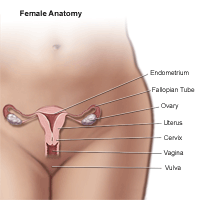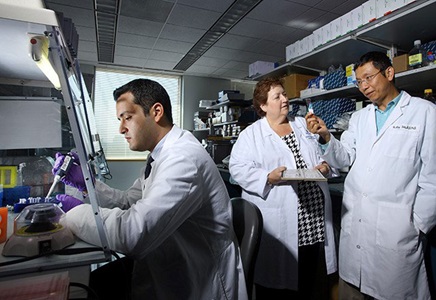Can You Have Cervical Cancer Again After Hysterectomy
Vaginal Cancer
What You Demand to Know
- Vaginal cancer is very rare. In the U.S., close to 3,000 women are diagnosed with vaginal cancer each year.
- There is no screening test for vaginal cancer.
- The HPV vaccine can foreclose the strains of HPV responsible for well-nigh cervical, vaginal and vulvar cancers.
- Run a risk factors that may increase a adult female'south chances of developing vaginal cancer include age, prior diagnosis of HPV and exposure to diethylstilbestrol every bit a fetus.
- When found early on, treatment for vaginal cancer is typically very successful.
What is the vagina?

The vagina is the passageway through which fluid passes out of the body during menstrual periods. It is likewise called the nativity canal. The vagina connects the cervix (the opening of the womb, or uterus) and the vulva (the external genitalia).
What is vaginal cancer?
Cancer of the vagina, a rare kind of cancer in women, is a illness in which malignant (cancer) cells are institute in the tissues of the vagina.
There are several types of cancer of the vagina. The two virtually common are:
-
Squamous cell cancer (squamous carcinoma):
-
Squamous carcinoma is most frequently found in women older than sixty and accounts for about 70 pct of all vaginal cancers.
-
-
Adenocarcinoma:
-
Adenocarcinoma is more often found in women older than 50 and accounts for nearly fifteen percent of all vaginal cancers.
-
A rare grade of cancer called clear-cell adenocarcinoma results from the use of the drug diethylstilbestrol (DES) given to pregnant women betwixt 1940 and 1971 to continue them from miscarrying. Information technology occurs about often in the daughters of the women who took DES.
-
Other Types of Vaginal Cancer
Other, less common types of cancer that can be found in the vagina include:
-
Malignant melanoma
-
Leiomyosarcoma
-
Rhabdomyosarcoma
-
Cancers that begin in other organs, such as the neck and rectum, and spread to the vagina
Vaginal Cancer Prevention
The HPV vaccine can prevent the strains of HPV responsible for most cervical, vaginal and vulvar cancers.
HPV vaccines tin simply exist used to prevent certain types of HPV. They cannot be used to care for an existing HPV infection. To be nigh effective, one of the vaccines should be given before a person becomes sexually active.
[[health_promise_womens_health]]
Vaginal Cancer Causes/Risk Factors
The following factors may increment a woman's chance of developing vaginal cancer:
-
Age: Well-nigh one-half of cases are in women 70 or older.
-
Exposure to diethylstilbestrol (DES) as a fetus (female parent took DES during pregnancy)
-
History of cervical cancer
-
History of cervical precancerous weather condition
-
HPV infection
-
HIV infection
-
Vaginal adenosis
-
Vaginal irritation
-
Smoking
Vaginal Cancer Symptoms
The post-obit are the virtually mutual symptoms of vaginal cancer. However, each individual may experience symptoms differently. Symptoms may include:
-
Haemorrhage or discharge not related to menstrual periods
-
Difficult or painful urination
-
Pain during intercourse
-
Hurting in the pelvic area
-
Constipation
-
A mass that can exist felt
Even if a woman has had a hysterectomy, she still has a chance of developing vaginal cancer. The symptoms of vaginal cancer may resemble other conditions or medical bug. Always consult a doctor for diagnosis.
Vaginal Cancer Diagnosis
There are several tests used to diagnose vaginal cancer, including:
-
Pelvic exam of the vagina, and other organs in the pelvis: This is done to bank check for tumors, lumps or masses.
-
Colposcopy: This procedure uses an instrument, chosen a colposcope, with magnifying lenses to examine the cervix and vagina for abnormalities. If aberrant tissue is institute, a biopsy is usually performed; this is called a colposcopic biopsy.
-
Pap test (also called Pap smear): This test involves the microscopic exam of cells collected from the cervix, used to notice changes that may be cancer or may lead to cancer, and to show noncancerous weather condition, such as infection or inflammation.
-
Computed tomography scan (CT or Cat scan): This diagnostic imaging procedure uses a combination of X-rays and reckoner technology to produce horizontal, or axial, images (oft called slices) of the body. A CT scan shows detailed images of the trunk, including the basic, muscles, fat and organs. CT scans are more detailed than general X-rays.
-
Magnetic resonance imaging (MRI): This diagnostic process uses a combination of large magnets, radiofrequencies and a estimator to produce detailed images of organs and structures within the body.
-
Positron emission tomography (PET) scan: Radioactive-tagged glucose (sugar) is injected into the bloodstream. Tissues that employ the glucose more than near normal tissues, such as tumors, tin exist detected by a scanning machine. PET scans tin exist used to observe small tumors or to cheque if treatment for a known tumor is working.
-
Biopsy: This process removes tissue samples from the vagina for examination nether a microscope to determine if cancer or other aberrant cells are present. The diagnosis of cancer is confirmed only by a biopsy.
It is very important that your particular findings be put into context by an skillful. Gynecologic oncologists are subspecialists with avant-garde training in the diagnosis, treatment and surveillance of female cancers, including vaginal cancer.
[[gynoncsurgery]]
Treatment for Vaginal Cancer
Specific treatment for vaginal cancer will be determined by your physician based on:
-
Your overall health and medical history
-
Extent of the disease
-
Your tolerance for specific medications, procedures or therapies
-
Expectations for the course of the disease
Generally, there are 3 kinds of treatment bachelor for patients with cancerous or precancerous weather condition of the vagina:
-
Surgery:
-
Laser surgery to remove the cancer, including LEEP (loop electroexcision process)
-
Local excision to remove the cancer
-
Vaginectomy to remove all or role of the vagina
-
Total hysterectomy
-
-
Radiation therapy: the utilize of X-rays, gamma rays and charged particles to fight cancer
-
Chemotherapy (topical): the use of anticancer drugs to treat malignant cells

Genetic Testing Aids Early Detection
Johns Hopkins researchers are difficult at work developing new detection methods for gynecologic cancers. Acquire more than and discover how genetic testing for these cancers is saving lives.

Obesity and Cancer Risk
Did you know that upwards to one-tertiary of cancer deaths in women are attributed to excess trunk weight? Director of Gynecologic Oncology Amanda Fader and oncology dietitian Mary-Eve Dark-brown discuss the correlation between the 2. Learn what yous tin do to reduce your risk.
washingtonanythincel.blogspot.com
Source: https://www.hopkinsmedicine.org/health/conditions-and-diseases/vaginal-cancer
0 Response to "Can You Have Cervical Cancer Again After Hysterectomy"
Post a Comment